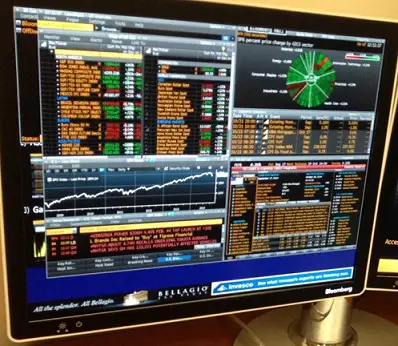US stocks were battered again on Monday, as the S&P 500 closed at a new low for 2022 and the Dow Jones Industrial Average closed officially in a bear market. Analysts noted there will likely be more turbulence coming this week as investors confront fears of excessive fed tightening, and currency markets see a wild run.
The S&P 500 dropped 1% as the Dow lost 1.1%, shedding over 300 points. The Nasdaq lost 0.6%, wiping out a gain of more than 1% earlier in the day. The CBOE volatility index hit 31, its highest level since June 17th, indicating increasing fear among investors which may translate into more losses as that fear sentiment turns pessimistic over time.
These losses came on the heels of the Dow losing 4% last week, as the S&P 500 lost 4.6% for the week, and the Nasdaq lost roughly 5.1%.
Among bonds, the rate-sensitive 2-year Treasury rose above 4.28%, a new 15 year high while the 10-year Treasury topped 3.82%, the highest it has risen since April of 2010.
In commodities, Brent futures continued to decline, dropping below $85 per barrel on fears of a global recession crushing demand.
The dollar meanwhile hit its highest level since May of 2002. At the same time, the British pound plunged by about 4%, hitting $1.03 – an all time low vs the dollar. Britain’s government announced a new plan to cut taxes by the biggest amount in 50 years, as the government would boost spending. The government’s move as seen as directly undermining the currency tightening the Bank of England has been trying to implement to strengthen the currency. The pound later rose back to $1.07.
Susannah Streeter, a Hargreaves Lansdown Senior Investment and Markets Analyst, said in a note, “The worry is that not only will borrowing balloon to eye-watering levels, but that the fires of inflation will be fanned further by this tax giveaway, which offers higher earners the bigger tax break.”
While many fear the Federal Reserve has decided a recession will be necessary to curb price increases due to inflation, some took a bit of solace from Atlanta Fed President Raphael Bostic, who made statements indicating that at least some policymakers are hoping inflation can be curbed without significantly impacting the economy or jobs.
In a Sunday interview on CBS’s “Face the Nation,” he said, “I do think that we’re going to do all that we can at the Federal Reserve to avoid deep, deep pain,” Bostic said. “We’re still creating lots of jobs on a monthly basis, and so I actually think that there is some ability for the economy to absorb our actions.”

